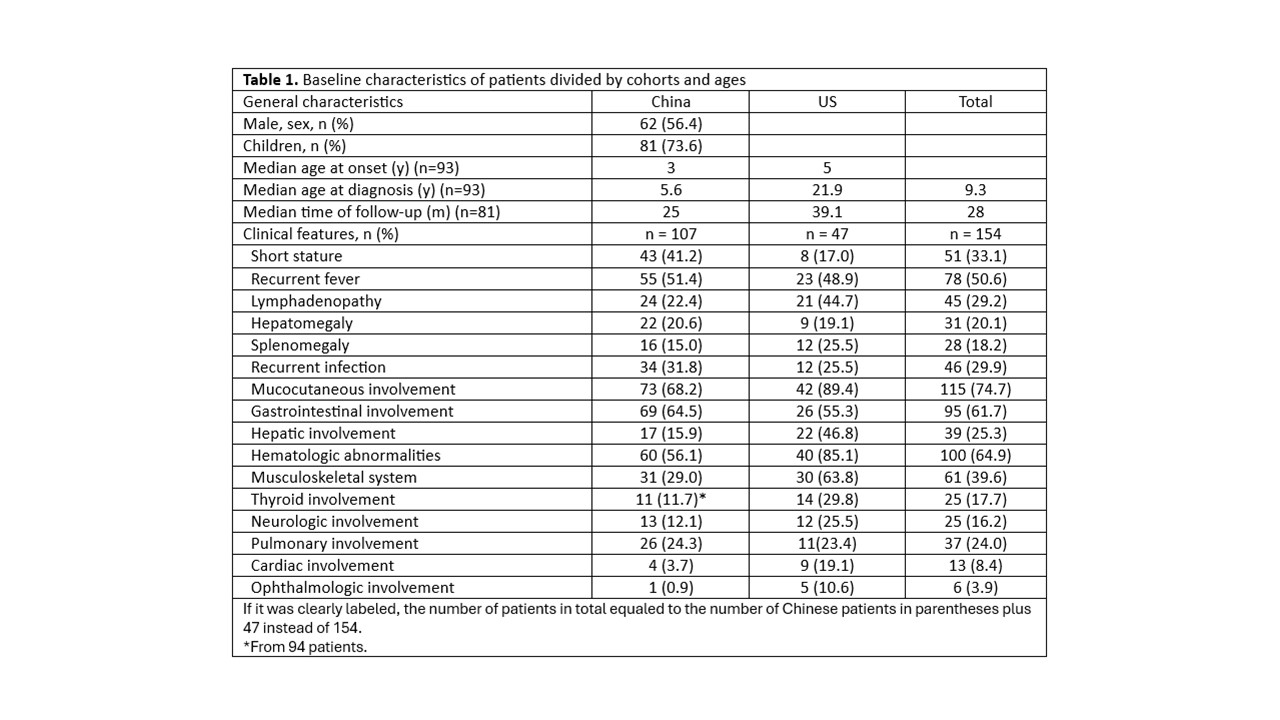Session Information
Date: Tuesday, October 28, 2025
Title: (2015–2051) Miscellaneous Rheumatic & Inflammatory Diseases Poster III
Session Type: Poster Session C
Session Time: 10:30AM-12:30PM
Background/Purpose: Haploinsufficiency of A20 (HA20) is a monogenic autoinflammatory disease caused by loss-of-function (LOF) mutations in TNFAIP3. HA20 was initially described as an early-onset form of Behçet’s disease (BD)1; however, subsequent reports have revealed a broad clinical picture that can also include features of autoimmunity, lymphoproliferation, immunodeficiency, and allergy. The initial clinical descriptions could have led to an inaccurate representation of the natural history due to reporting or ascertainment bias. This study is the first large multicenter cohort study describing the clinical spectrum, genetic landscape, and natural history of patients with HA20.
Methods: A retrospective analysis was conducted on HA20 patients referred to the study investigators following genetic testing that revealed a pathogenic or likely pathogenic variant in TNFAIP3. All variants were reviewed by study investigators in consultation with geneticists at participating sites. The diagnosis of HA20 was established through the identification of either a heterozygous TNFAIP3 pathogenic variant (ACMG PVS1) or a heterozygous deletion of 6q23 including TNFAIP3. Probands were identified using multigene panels, chromosomal microarrays, or next gen sequencing-based clinical assays. Some family members were diagnosed using single-gene TNFAIP3 testing after the initial proband diagnosis. Patients were divided into three groups (≤ 6 years, 6-16 years, and ≥ 16 years) for further analysis of the phenotype distribution.
Results: A total of 185 patients with HA20 from 41 rheumatology clinics across 7 countries were included. The median age at onset was 3.3 (range: 0.04-30). Detailed clinical records were available for 169 patients. Among them, 75 (44.4%) presented with an autoinflammation-predominant phenotype, 26 (15.4%) with an autoimmunity-predominant phenotype, and 56 (33.1%) exhibited a mixed autoimmune-autoinflammatory phenotype. Autoinflammation-predominant disease was most common in the youngest age group (p = 0.029) and in the Chinese group (p < 0.0001). A total of 89 TNFAIP3 pathogenic mutations were identified, including novel variants resulting in protein truncation or heterozygous deletion. No clear association was found between clinical phenotype and genetic architecture. Anti-TNF and anti-IL-1 agents were effective in most patients (60% and 63.2% respectively), particularly in those with inflammatory arthritis or gastrointestinal ulcers. Two thirds of patients achieved complete remission at their last follow-up visit.
Conclusion: HA20 presents with highly variable phenotypes, including autoinflammation-predominant, autoimmune-predominant, and mixed phenotypes. Autoimmunity may become more common over time and have a lower incidence in individuals with specific ancestries, although these differences could still be related to ascertainment bias in specific age groups and/or countries. No definitive genotype-phenotype correlation was observed. Lastly, this comprehensive and systematic description of a large international cohort may suggest improved precision medicine strategies for the complex care of HA20 patients.ReferencesZhou Q, et al. Nat Genet. 2016.
.jpg) Genetic analysis of HA20 patients.
Genetic analysis of HA20 patients.
A. Genetic analysis of this cohort revealed 85 pathogenic variants in TNFAIP3. Gene variants in red and black font represented novel variants and reported variants, respectively.
B. Common variants identified in HA20 patients.
To cite this abstract in AMA style:
Carpio Tumba M, He T, Wang J, Kairis E, Goyette K, Kethri A, Karri U, Towheed A, Yang J, Zhou Q, Schwartz D. The Largest International Cohort Study of HA20 Reveals Novel Genetic Architecture and Age-Dependent Phenotypic Evolution [abstract]. Arthritis Rheumatol. 2025; 77 (suppl 9). https://acrabstracts.org/abstract/the-largest-international-cohort-study-of-ha20-reveals-novel-genetic-architecture-and-age-dependent-phenotypic-evolution/. Accessed .« Back to ACR Convergence 2025
ACR Meeting Abstracts - https://acrabstracts.org/abstract/the-largest-international-cohort-study-of-ha20-reveals-novel-genetic-architecture-and-age-dependent-phenotypic-evolution/

